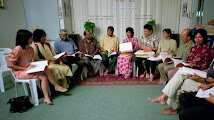"I'm interested to know what your life is like: what goals you aspire to (for yourself and your children); what challenges/problems you (and your family) are faced with.
Then I'd like to know what spiritual principles/teachings could be relevant for improving your life conditions (or for solving a chief life problem), and to know how I could support you in your efforts to implement them (besides with prayer) -- principles such as:
* service to mankind, including preparation for service (through studies/a profession)
* promoting the well-being and contentment of family members and kindred
* moral/spiritual training of children and youth
* attracting assistance from God through prayer and reflection over relevant passages in the Holy Writings
* shared responsibility (though with complementary roles) for women and men regarding chores, work and decision-making in general
* frank and open consultation with affected parties about issues concerning you and them
* seeing only the good in, and overlooking entirely the faults of others, i.e. forbearance and tolerance; etc."





